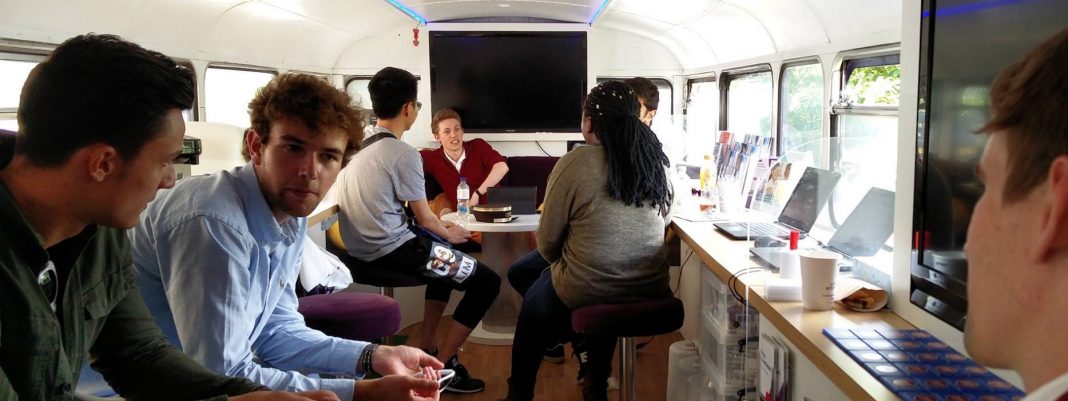Having spent the last 4 years travelling across the UK talking to a whole variety of education establishments, one thing always struck me as odd. It was the number of times I would talk to educators who had taken on the responsibility of helping build an enterprising culture in their institution and I would offer the same bit of advice. “Have you considered working with X institution down the road?” Nearly every time I offered this suggestion to educators I got the same response “That would be great, but our institution won’t let us, as the others are competitors”. This always baffled me. Why had educators suddenly decided that they weren’t doing what was best for their students?
Maybe it’s worth backtracking a little bit on this one and looking at the paradox of the entrepreneurial educator. I have always thought that the motivation for the good educator is that they aim to improve the lives of the people they are educating, whereas it could be argued that some entrepreneurs are determined to benefit themselves, above all others. I am aware the term commonly used is an enterprise educator, but does this mean that enterprise educators aren’t entrepreneurial or is there a need for enterprise educators to fit somewhere in the middle of entrepreneur and educator. This may be a discussion for another time, but certainly something that is key to the question of collaboration.
One of the first lessons I ever tell students is to take opportunity from the world around them and understand what opportunities are available. On this theory, using such a niche subject such as enterprise, the smartest approach would be work on the basis that in the education sector we are stronger as a group than as individuals and the experiences we can offer as a group are considerably more beneficial to the student experience than they would be in isolation.
Take the idea of giving students to pitch a business idea in their school, it’s a great opportunity, but extremely limiting when the ideas will come from a group of students often with the same background, around the same age and based in the same location. I would have seen that this event is likely to bring out the same old business ideas that all students come up with in these situations, be it selling cupcakes to homemade candles. Now imagine if you could take these school students and involve other schools from the area or further afield, students from the local college or university and even entrepreneurs acting as mentors. This diversity means the potential for innovation is much greater and the students get a much richer experience.
So why doesn’t this happen? At the moment, I can see two possible reasons for this, first and probably most concerning is educators who don’t have the passion for enterprise and are responsible for enterprise, out of requirement more than choice. This is a problem that at the moment can’t be easily dealt with, for a solution I will come to later.
It’s the second reason that I think is biggest problem we face as enterprise educators and that is the commercialisation of our method of education. I will be the first person to admit that I am guilty of at times being too much of an entrepreneur and not enough of an educator, by this I mean I will consider my way the best way and have found myself “Selling” my approach over a competitor. Admittedly this was much more common when I was working as an external contractor to institutions, but upon reflection I couldn’t always tell you if what I was doing was for the best of the students or for the benefit of the company I was representing.
Unfortunately, this might be what hurts our industry the most as not only does selling a variety of approaches often lead us to oversell what we can do and leave institutions upset, but we also make the entire process considerably more confusing than it needs to be. Going back to the original issue of collaboration, I don’t know how we can expect people to collaborate when as an industry; we have no real way form of uniformity in what we do. I am aware that some of the bigger organisations can offer inter-school competitions, but this is only sold on the basis of schools competing and very rarely on working together.
So, what’s the solution? This might not be the easiest problem to solve but I think it is the biggest problem we are facing, because until we can come to a conclusion on what enterprise education looks like, then how can we expect the education sector to take us seriously. Not only do we need to show that enterprise education shows results, but also we need to make sure we have pathways for entrepreneurs from Day 1 to when they leave education, which we can only do through collaboration.
In an ideal world, could we make enterprise fit into the education system like studying History, where although there are options and choices the further you go through education the pathways are clear and students can jump between them. Just as a young child can step into a history lesson at 5 years old and leave university with a degree in Modern American History at the age of 21 could and enterprising student start with a £5 challenge at the age of 5 then end up running a social enterprise though a venture creation programme when they leave university at 21 where the path they took would be equally clear.
How do we do this? There is a long and short term strategy for this, as in the long term the aim should be to develop national enterprise strategies for education that highlight what these pathways look like and can inform external providers of what they should be giving students. Hopefully giving enough clarity that these providers no longer need to be external and can be managed internally by educators who are familiar with good enterprise provision. This also gets rid of the unenthused staff problem I mentioned earlier as dedicating time and resource should attract people to the role who want to be involved in enterprise education. I do realise we might still be a way off this; however I think there is a short-term solution we can start now.
The short-term solution, I am aware this might be difficult, is to talk to each other and don’t just mean people that do the same things you do, I mean everyone. Find opportunities to talk with other people who teaching enterprise and even people who don’t know they are teaching enterprise (there are more than you would think). Talk about what you are doing and be honest about if it worked, we are a small community and just as we teach students, we need not only be open about our successes, but also about our failures. On top of this, talk to vertically in the chain if you’re in a school talk to a college, if you’re in a college talk to a school and a university, if you’re in a university talk to schools’ colleges and employers. In my dream scenario if I could interview a student in a few years’ time for a place on an enterprise course at a University and this student could tell me which enterprise activities they had done in the last 10 years and I knew exactly what that entailed it would be great. What would be even better would be if they could tell me they chose the approach of my degree course over another based on what they had done previously and then we would be in a position to cement ourselves in the curricula around the world.
So please just talk to each other, you can even risk being entrepreneurial and making the first move.








